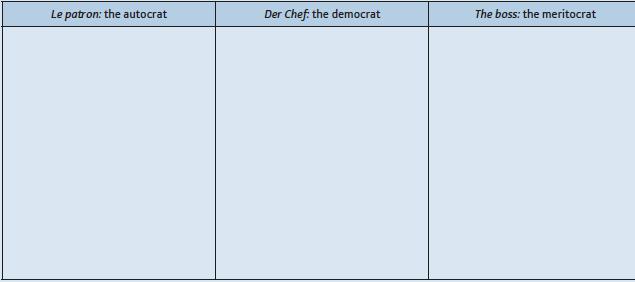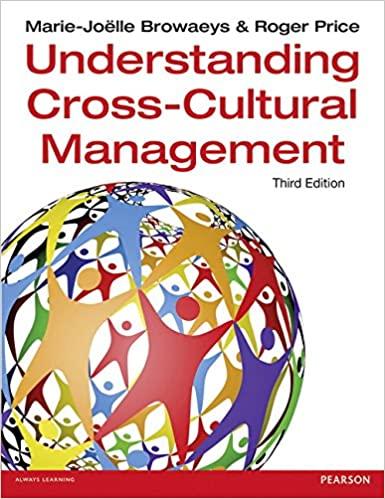Have you heard the one about the three captains of industry? The Brit insists he is happy
Question:
Have you heard the one about the three captains of industry? The Brit insists he is happy to have his decisions challenged. The German stresses the importance of humility. And the Frenchman enjoys wielding power without having to consult first.
Far from being a joke, these are the revealing findings of a new survey of 200 chief executives, chairmen and directors in the UK, Germany and France. It is often assumed that rules about leadership apply regardless of culture or nationality.
But the survey suggests this is an oversimplifi cation. It highlights big differences in national attitudes to responsibility, status and decision-making that global companies would do well to understand. The research, co-ordinated by MORI for DDI, an international human resources consultancy, labels French captains of industry as ‘autocrats’, Germans as ‘democrats’ and British as ‘meritocrats’.
In support of these catchy generalizations, it finds that fewer than three in 10 French bosses are happy to be challenged about the decisions they make, compared with half of Germans and more than nine out of 10 business leaders in the UK. The French prize the autonomy they gain from the job. Nearly two-thirds count ‘the freedom to make decisions with minimum interference’ as one of the three best things about being a leader. ‘I enjoy the decision-making without having to confer with others’, says one Gallic captain of industry. Only 46 per cent of bosses in Germany and 39 per cent in the UK regard this as being important.
The ability to hand-pick their team is another perk of the job for the French, but one that is less highly rated in Germany and Britain.
For business leaders in the UK and Germany, the best thing about the job is developing talent in the company. Seventy per cent of British bosses and nearly 50 per cent of Germans – but only 14 per cent of French ones – rate this among the top three benefits of leadership.
Although few of the 200 captains of industry choose ‘being in a position of power’ as one of the three best things about the job, the French are three times more likely than the British, and eight times more likely than the Germans, to regard this as important, the survey finds.
‘In Germany, you accept the responsibility of authority but you don’t talk about it, whereas typically in France, if you belong to the upper echelons of management, or if you own a company, it’s a badge of success that you wear in every aspect of your life’, says Steve Newhall, managing director of DDI Europe.
Public recognition is more important in France, reflecting the kudos attached to a senior position in business, he says. Just over 30 per cent of French chief executives and directors rate this as one of the three best things about being a leader, compared with 16 per cent in Germany and just two per cent in the UK.
Is it possible that these differences simply reflect greater honesty from the French about enjoying the exercise of power, while the British and Germans consider this would be politically incorrect? Mr Newhall admits it is hard to be sure, but he says the anonymity of the interviews makes it likely these are genuine differences.
‘The intention was to get as honest an answer as possible and to probe behind the PR’, he says.
‘The French are more likely to respond in that way because it’s something that’s acceptable within their cultural norms. We know about the grandes écoles system where the elite are prized.
In the UK, “the establishment” is used more as a derogatory than a positive term.’
He says he is not suggesting that one leadership style is better than another. But executives of international companies need to be like chameleons, able to adapt to the corporate and national culture in which they are working, while not abandoning their individualism.
‘The danger for any leader is only being able to operate within one of these styles. If you take an autocratic style into a culture that expects a more democratic or meritocratic style, the chances are that you will trip up.’
German leaders stand out in the survey for their social conscience and their concern about the responsibility that goes with power. Nearly half say that one of their top three concerns is having to make tough decisions that affect people’s futures – compared with only 28 per cent of leaders in the UK and 20 per cent in France.
‘Sometimes the amount of influence I have frightens me’, says one German boss. ‘I have to be very cautious and thoroughly weigh up the pros and cons of any decision.’ Another comment: ‘You have to remain humble: personal vanity and over-estimating your ability will lead to the downfall of the enterprise.’
Given such modest responses, it is perhaps paradoxical that deference is strongest in Germany, with nearly 60 per cent of business leaders saying their decisions are likely to go unchallenged.
Four in 10 German bosses cite fear of failure as a top concern, compared with just over two in 10 in Britain. Mr. Newhall believes this reflects the lingering stigma of failure in Germany, which contrasts with the Anglo-American preference to see failure as an opportunity to learn and move on.
Leaders in the UK appear the most upbeat, perhaps because of the more stable economic environment, the research fi nds. What keeps them awake at night are external pressures, such as new legislation and corporate governance issues.
For French leaders, warring egos in the management team are a big concern. While this may simply reflect Gallic style, the DDI report suggests that French chief executives’ fondness for independent decision-making may lead to friction.
Despite the many differences, some worries and beliefs are shared across all three countries. Lack of personal time is a common concern. The importance of the team is widely appreciated. ‘Again and again, in private one-to-one interviews, whether face-to-face or on the phone, captains of industry stated their focus to be on responsibility rather than power, and on their team’s success rather than their own’, says Mr
Newhall. This emphasis on collaboration is epitomized by a German boss who says: ‘I see myself as a service provider in a company run as a democracy, where everyone pulls together to achieve the strategies we have worked out together.’ A French respondent concurs: ‘We are working in an ever more complex environment, and working efficiently within a team is the best way.’
A final common theme is that the risks increase the higher you get, and that nothing can fully prepare you for the challenge of running a company. Enjoy it while it lasts. As a German respondent puts it: ‘It is a long hard climb to the top of the mountain. There is a nice view, but it is quite windy.’
Questions
1. Look again at the text and try to determine what questions were used in the survey.
2. Enter key examples in the table below of behaviour or attitudes that reflect the label given to each type of leader at the beginning of the article.

3. How reliable in your opinion, are the results of the survey? Refer in particular to the comments made in the text about the ‘honesty’ of the respondents.
4. If you were asked to classify the business leaders in your country, which of the above labels would you use to describe them? Give examples of behaviours that reflect your labelling.
5. If the title of the article had been ‘ La patronne , die Chefin and the female boss’, how valid do you think the results of the survey would have been? What behavioural or attitudinal differences – if any – would you have expected to see in the survey?
Step by Step Answer:

Understanding Cross Cultural Management
ISBN: 9781292015897
3rd Edition
Authors: Marie Joelle Browaeys, Roger Price





